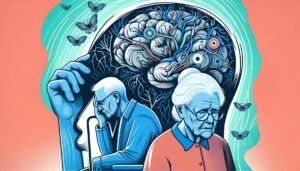
Cognitive decline doesn’t get a whole lot of air time in the mental health world; it is often delegated to family physicians, written off as an unfortunate medical process of aging. Yet cognitive impairment and decline, including the development of dementia, are hugely impactful to a person’s and their loved ones’ psychological well being. Working with folks throughout stages of cognitive decline involves a team of interdisciplinary clinicians who emphasize holistic care for body, mind, and spirit. Understanding the multifaceted nature of cognition can support individuals in prevention, maintenance, and comfort.
Dispelling Myths

Yes, cognitive decline is more common among the aging population. Yet despite popular belief, cognitive impairments are not solely an inevitable part of aging. For one, cognitive impairments can show up as a symptom of other psychiatric diseases. Reversible cognitive impairments also arise as a result of infections, sleep deprivation, stress, inflammation, microbiome disruption, or nutrient deficiencies.
Of course, cognitive decline, including mild cognitive impairment, is a feature of a number of neurological disorders. Dementia in particular is characterized by progressive decline in memory, thinking, behavior, and the ability to perform everyday activities. Alzheimer’s disease is the most common form of dementia.
Cognitive decline is often thought of as progressing in linear stages, from very mild to severe, wherein dementia is diagnosed at the moderate stage; in fact, these stages are commonly expressed in a rhythmic manner, with folks cyclically ebbing and flowing between progression, remission, and stabilization across severity.
Understanding Physiological Contributors
For a long time, genetic contributors to cognitive decline were prioritized over environmental factors. While family history and genetics are a critical consideration for risk and progression, within integrative medicine, the focus is shifting toward focusing on modifiable factors. Given new research on epigenetics, lifestyle may have a bigger impact on long-term and generational physiology than we’ve previously given it credit for.
Emerging research suggests that metabolic dysfunction may underlie common forms of cognitive decline and progressive dementia. For example, Alzheimer’s disease has been referred to as “type 3 diabetes” due to similarities in glucose dysregulation and insulin resistance found in the brain. In fact, a diabetes diagnosis is linked to increased risk for developing dementia later in life.
Yet this is only part of the story. Chronic inflammation and oxidative stress from other root causes are also implicated in the pathogenesis of dementia. Inflammatory processes in the brain can lead to neuronal damage and impair cognitive function. Additionally, oxidative stress, resulting from an imbalance between free radicals and antioxidant defenses, contributes to neurodegeneration. Considering the impacts of nutrition and lifestyle on metabolic, immune, and endocrine functioning, it is no surprise that social determinants of health are highly connected with cognitive health.







